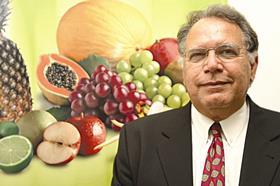
Why do you feel this is a good time to get involved in fruit production?
Brazil is the third-biggest producer of fruit in the world, with most of this done by small and medium-sized growers. The advantage of having these smaller producers is they are getting financial support with things like credit lines to start and grow in agriculture, which also means that a lot of people are interested in getting involved.
The government gives credit to the banks specifically for agriculture and the banks distribute that to the producers. They have separate credit to produce it, promote it, buy equipment and so on.
What’s the growth potential for the Brazilian fruit industry?
We have 2.2 million hectares of fruit production, with 45m tonnes of fruit grown annually. We are lucky in Brazil because of the weather and the diversity of land, and potentially we can triple the production of fruit without deforesting or invading other trades such as meat as there’s enough space. We can increase productivity with new techniques and equipment, and producers have been working with national and international research
organisations to improve the quality of the plants and learn the best way to cultivate them and offer the market better quality. There have also been ecological studies to see which crops grow best in each region. The banks are also helping to finance this. With that support people won’t waste time planting what won’t grow so they’ll be more efficient.
How important is collaboration?
As many of the farmers are small landowners they need to be organised and create enough product to export. The biggest problem is trying to administrate that. It’s difficult to get them organised to help one another. They can be more competitive together, but at the moment they don’t work as a partnership as much as they need to.
How do you see the split between the domestic market and exports going forward?
The focus is on the internal market first of all. Brazil has a population of 197 million people. Ten years ago its social image was very different, but 30m people have come out of the bottom social level, which has meant more product is needed for the domestic market.
Around 30 per cent of our fruit is exported, the majority of which is processed fruit. We are still concentrating on Europe as our principal market, with 80-90 per cent of our exports, which is both a good and bad thing. Europe is still in recession, and people are spending less. People know fruit is good for you and won’t stop eating it but they will look at cheaper versions. That puts pressure on buyers and then suppliers.
What opportunities do next year’sfootball World Cup and the 2016Olympics give to the fruit industry?
Apex [the Brazilian trade promotional body] has been working to promote fruit and has been discussing ways to add value during the World Cup and Olympics. They’ve been looking at bringing buyers over to promote the country and the industry and that kicked off this year with Carnival. We are calling this ‘receptive tourism’. They will work together with hotels to offer fruits, juices and so on, and they are looking at sales promotions with supermarkets. —



